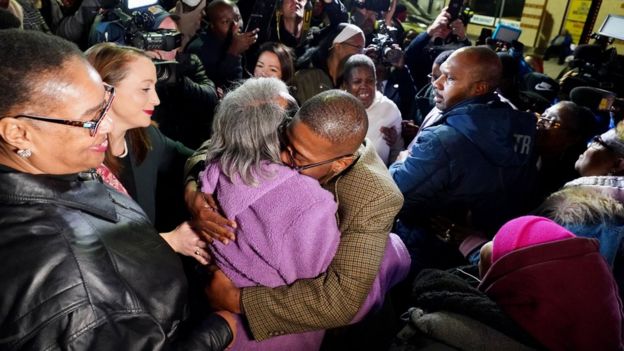
This article is more than
6 year old
Alfred Chestnut, Andrew Stewart and Ransom Watkins had been sentenced to life in 1984 for killing a 14-year-old boy a year earlier.
They were freed in Baltimore on Monday after a judge cleared their convictions following a review of their case.
The case was reopened this year after Mr Chestnut sent a letter to Baltimore's Conviction Integrity Unit.
He included evidence he had uncovered last year.
Mr Chestnut, Mr Stewart and Mr Watkins were arrested as teenagers in November 1983 following the death of DeWitt Duckett, who was shot in the neck on his way to class at a Baltimore junior high school and had his Georgetown University jacket stolen.
DeWitt's death received widespread press coverage. It was the first fatal shooting of a student in a Baltimore public school.
"These three men were convicted, as children, because of police and prosecutorial misconduct," Baltimore state attorney Marilyn Mosby said after the men were released.
In a statement, her office said "detectives targeted the three men, all 16-year-old black boys, using coaching and coercion of other teenage witnesses to make their case".

Prosecutors said during the initial investigation police ignored and withheld reports from multiple witnesses identifying another person as the killer, and that trial witnesses failed to identify the three teenagers in photo line-ups.
All trial witness have now recanted evidence, Ms Mosby said.
"I don't think that today is a victory, it's a tragedy. And we need to own up to our responsibility for it," she said.
The other suspect died in 2002.
Case documents had been sealed by a judge, but Mr Chestnut obtained them last year with a public records request.
At a press conference, Mr Watkins said "this should never have happened".
"This fight is not over," he said. "You all will hear from us again."
Ms Mosby also announced the launch of a new programme - Resurrection After Exoneration - to provide services to help exonerated people reintegrate into society, including support for education and mental and physical health.
She said the state of Maryland did not have legislation that guided compensation for those falsely convicted of a crime, and that she would work to change that.
Currently, the Board of Public Works has the authority to direct compensation.
In October, the board awarded about $9m (£7m) in payments to five men who were wrongfully imprisoned for decades. Walter Lomax - who served 38 years for murder - received about $3m, the largest payout ever made by the state for a wrongful conviction.